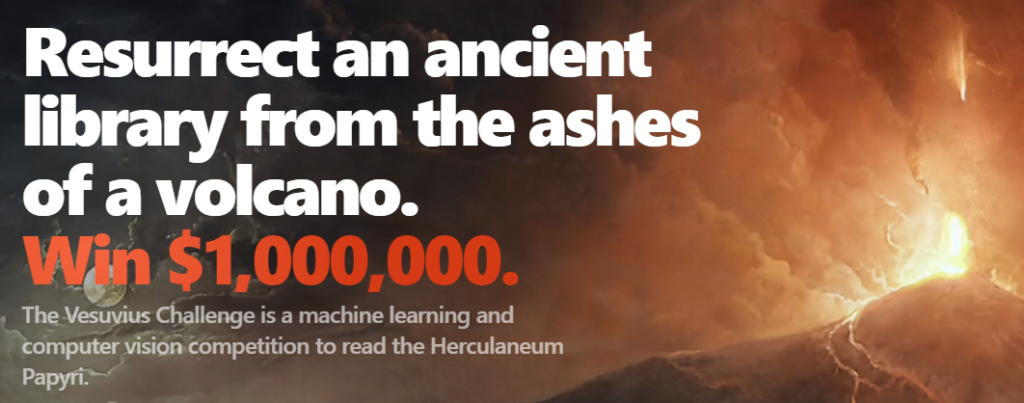Among the many cities destroyed in the eruption of Mount Vesuvius in 79 AD was Herculaneum, a Roman city that housed a library. Nearly 1,700 years later, the remains of about 800 papyrus scrolls buried about 20 meters deep in mud and virtually fossilized over time were discovered. Since then, researchers have attempted to decipher the contents of these scrolls, but without unrolling them, as they would otherwise disintegrate.
For this reason, a handsome sum of money was offered as a prize for the so-called “Vesuvius Challenge,” in which the goal is to decipher the mysterious contents of the papyrus scrolls. The total amount of prize money offered is one million U.S. dollars. Luke Farritor, a student at the University of Nebraska-Lincoln, recently managed to decipher a word on one of the scrolls using artificial intelligence. This earned him the “First Letters Prize” and $40,000 in prize money – a reward for deciphering at least ten letters on an area no larger than four square centimeters.
A short time later, Youssef Nader, a student at Freie Universität Berlin, discovered the same word in the same place on the papyrus scroll. He received a $10,000 prize for this discovery. It is reported that he was also able to identify four columns of more than six lines each. Farritor probably discovered other characters as well. Before them, scientist Casey Handmer had used a machine-learning algorithm he developed himself to prove that ink was present in the scrolls, which also earned him a $10,000 prize.
Farritor and Nader’s work was based on Handmer’s research findings. They were able to move forward thanks to high-resolution 3D images created at the University of Kentucky in 2019. At that time, scientists had shone a particle accelerator through the unopened rolls to better visualize their contents. In an article, the scientific journal Nature described in detail how the two students proceeded with the decoding.
With the grand prize of $700,000 still to be paid out, which will be awarded to the team that is the first to read four passages of text from inside one of the two scrolls under study, interested researchers have until Dec. 31, 2023. The organizers of the “Vesuvius Challenge” see this grand prize as “absolutely achievable” in light of recent discoveries.
The discovered word in Farritor’s work is “ΠΟΡΦΥΡΑϹ” (porphyras), which means “purple.” However, it is still unclear whether this word is a noun or an adjective due to the lack of additional context. Nader’s decipherment even revealed additional letters that may represent two more words: “ανυοντα” (anyonta), meaning “reach,” and “ομοιων” (omoiωn), meaning “similar.” It remains to be seen when and if more words can be deciphered.

